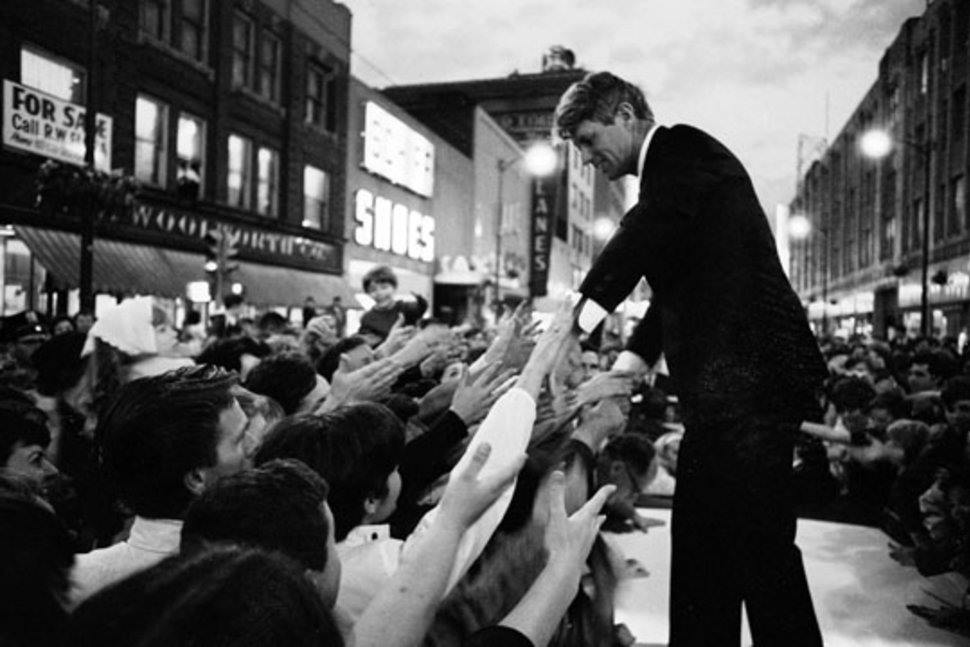Late OTD in 1968, Robert F. Kennedy arrived in Indianapolis exhilarated by what he told an aide it had been the best day of campaigning he had ever experienced.
Exhausted from the marathon day of campaigning for the Indiana primary, tired reporters checked into the Airport Holiday Inn to sleep for a few hours before the polls started opening around the state.
Some of the media adjourned to the hotel’s bar for a nightcap, including Jules Witcover and his friend Jack Germond. In a rare occurrence, Kennedy walked over to where the two men were sitting at a small table.
Declining their invitation to sit down, the candidate remained standing as he contemplated what had happened that day. “Well, I’ve done all I could do,” said Kennedy. “Maybe it’s just not my time. But I’ve learned something from Indiana. The country is changing.”
Witcover said Kennedy continued to talk about the need for the Democratic Party to look to new coalitions of voters that included whites and blacks in the North.
RFK also could not keep from thinking about one of the few negative aspects of the day, a young man holding a sign denigrating Kennedy and then running beside his car, grabbing his hand, and squeezing it so hard he thought he was trying to break it.
Kennedy continued his reflective mood during an early morning meal he shared with reporters and friends at about 1:30 a.m. at a restaurant named Sam’s Attic near the Marott Hotel.
Among those in attendance were Jack Newfield of the Village Voice, David Halberstam of Harper’s magazine, Loudon Wainwright of Life magazine, and John Douglas from the senator’s campaign staff.
“He was in a good mood,” Douglas said of Kennedy. “He was satisfied that he’d done all that he could.”
Newfield recalled that Kennedy looked the way boxer Tony Zale must have looked like following his epic bouts with Rocky Graziano, as the candidate’s hands were “red and swollen and cut” by the thousands of people that had grabbed for them during the day, and he looked worn out.
Kennedy reflected on his experiences in the state and concluded that Hoosier voters, for the most part, had treated him with fairness. “They listened to me. I could see this face, way back in the crowd, and he was listening, really listening to me,” Kennedy recalled.
“The people here are not so neurotic and hypocritical as in Washington or New York. They’re more direct. I like rural people, who work hard with their hands. There is something healthy about them.”
Douglas said Kennedy seemed pleased by the vast numbers who had come out to see him, but instead talked about a few episodes that had stuck in his mind. One involved a woman who had come up to him and asked if he could come over to see her mother, a victim of a stroke.
“The older woman had been wrapped up in a shawl and had been sitting on her lawn for a long time,” said Douglas. “Bob had gone up and had a nice chat with her.”
RFK had also enjoyed seeing a young man he had noticed on a previous visit to Gary who had been carrying a brother or sister on his back as he ran to meet the Kennedy motorcade.
Seeing him again, Kennedy asked him to ride along in the car with him for awhile. In addition to reflecting on the campaign, RFK also talked about his love for his family—his brothers, sisters, and parent.
“He talked . . . about how the face of many of the black youngsters in their early years were very animated, and how as the youngsters got older their faces turned into kind of lifeless masks as a result of the prejudice and hostility and difficulties which they encountered.”
The contemplative mood was shattered when a man who had been drinking wandered over and said some harsh things about the candidate. Kennedy refused to respond, and when the man finally left, the candidate said: “You get so tired sometimes. You have to restrain yourself

 Read on Twitter
Read on Twitter


